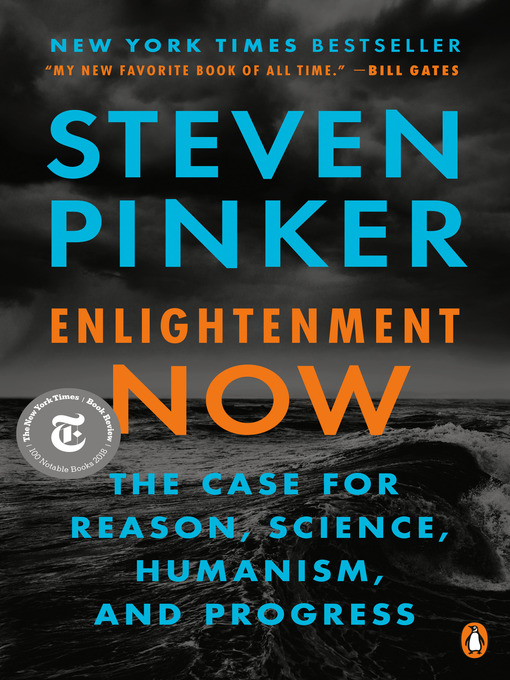
Enlightenment Now
The Case for Reason, Science, Humanism, and Progress
کتاب های مرتبط
- اطلاعات
- نقد و بررسی
- دیدگاه کاربران
نقد و بررسی

September 15, 2017
In 2011's The Better Angels of Our Nature, surging back as a best seller after Bill Gates recommended it as a graduation present in May, Harvard cognitive scientist Pinker presented evidence that over millennia our world has grown less violent. Here he offers 75 graphs showing that key factors such as health, happiness, prosperity, educational rights, environmental quality, and quality of life are on the upswing worldwide. With a ten-city tour.
Copyright 2017 Library Journal, LLC Used with permission.

December 11, 2017
Harvard psychology professor Pinker (The Sense of Style) defends progressive ideals against contemporary critics, pundits, cantankerous philosophers, and populist politicians to demonstrate how far humanity has come since the Enlightenment. These ideals, as well as progress, science, reason, and humanism, are explored through the lenses of evolutionary biology, physics, sociology, anthropology, and, of course, history. Pinker explores the fallacies that critics of progressive ideals employ and presents graphs and statistics to demonstrate that issues such as income inequality, terrorism, and racial intolerance are not at the crisis levels the hysterical media commonly suggests. He astutely captures the deceptive techniques of the naysayers whose opinions alter those of the wider public, describing “the social critic’s standard formula for sowing panic: Here’s an anecdote, therefore it’s a trend, therefore it’s a crisis.” In the book’s final section, Pinker explores how political discourse exploits cognitive biases, exacerbating polarization and partisanship, and how humanism is a preferable ideology to its main rivals, theism and nationalism. In an era of increasingly “dystopian rhetoric,” Pinker’s sober, lucid, and meticulously researched vision of human progress is heartening and important. Agent: David Brockman, Brockman Inc.

December 15, 2017
The bomb? The plague? Trump? Not to worry; things are getting better. So writes eternal optimist Pinker (Psychology/Harvard Univ.; The Better Angels of Our Nature: Why Violence Has Declined, 2011, etc.)."Why should I live?" So asked one of the author's students. "Explaining the meaning of life is not the usual job description of a professor of cognitive science," he writes--before gamely proceeding to answer that very question from a variety of stances, all resting on the assumption that life is best endowed with meaning if only we remember our Enlightenment ideals. Those ideals, "products of human reason," hinge on--well, reason, and science, the latter the "refining of reason to understand the world." Against these are what Pinker characterizes as manifestations of delusional thinking, including religious faith and the "hermeneutic parsing of sacred texts," the "suffocating political correctness" on campus, the "disaster of postmodernism" that has devastated humanistic thought, and the "identity-protective cognition" that has made political discourse so soul-killing. Pinker's protestations are progressive, though the academically orthodox will find him an apostate. Just so, his atheism may put him in company with Christopher Hitchens and Sam Harris, but he would doubtless say that it's the only logical conclusion to come to, and Pascal's wager be damned. In a long, overstuffed, impeccably written text full of interesting tidbits from neuroscience and other disciplines, the author examines the many ways in which Enlightenment ideals have given us lives that our forebears would envy even if gloominess and pessimism are the order of the day--on which he sensibly remarks, "a modicum of anxiety may be the price we pay for the uncertainty of freedom." There's work to be done, of course, from educating the illiterate and innumerate to taking the world's nuclear arsenal down to, ideally, zero, and much else besides.For those inclined to believe that the end is not nigh and who would like to keep up with recent science, this book is a...well, not a godsend, but a gift all the same.
COPYRIGHT(2017) Kirkus Reviews, ALL RIGHTS RESERVED.

























دیدگاه کاربران